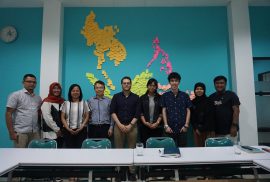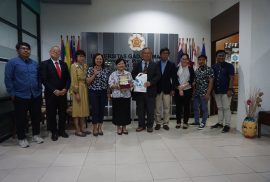‘You can live without money, but you cannot live without love’, the romantic quote that many people may have heard before, or even grown up with it. However, in some parts of the world, you cannot love without money, and marriage is more than a ceremony to declare two people’s love. Some lovers cannot be together because of their status differences, and sometimes marriage strongly involves social status and financial stability. They are the bride price I am talking about, the price of love.
The fourth industrial revolution, commonly known as Industry 4.0, is bringing rapid technological advancements -powered by the rise of digital technologies: cloud, big data, Internet of Things, Analytics, and Machine Learning-, changing the nature of work and increasing demand for a skilled workforce. Technology’s impact on the workforce was inevitable, adding that the most important action was responding to digital developments to optimize the workforce and its talents. Hence, industry 4.0 is rapidly transforming not only IT but business in general, particularly in terms of human-technology relationships.
SEA Chat #18: Panel Discussion “eSports in Thailand” and “Military Conscription & Transgenders” with Dallas Kennamer (Psychology, Thammasat University) and Suchanaad Dhanakoses (English, Thammasat University) at CESASS UGM Library (18/07/19). Thank you for your participation and see you at our next event!
SEA Talk #26 “Indonesia-Austria Bilateral Relation” with Simon Gorski (University of Vienna) at CESASS UGM Library (18/09/19). Thank you for your participation and see you at our next event!
SEA Talk #25 “Futures Studies and Social Sciences: The Future We Want” with Prof. Dr. Jian-bang Deng, a Professor of Sociology at the Graduate Institute of Futures Studies (GIFS) of Tamkang University at CESASS UGM Library (02/07/19).Thank you for your participation and see you at our next event!
Rodrigo Duterte was appointed as President of the Philippines on July 1, 2016. At the same time, he realized his political promise to catch up drug lords, through a war on drugs policy. War on drugs attempts to eliminate drug trafficking and use in the Philippines by arresting and/or killing dealers, both large dealers and small dealers, and drug users. In its implementation, Duterte hired police, paramilitaries, and assassins (BBC News, 2016).
The Philippines did suffer from drug emergencies as Duterte said in his speeches. According to data from the Dangerous Drugs Board (DDB) in 2016, drug users in the Philippines reached 1.8 million, equivalent to 1.8% of the total population of the Philippines which reached 100.98 million people. The data was collected from the age range of 10-69 years which at least had used drugs even once in his life (Gavilan, 2016).
Last Friday (21/06/19), Center for Southeast Asian Social Studies, UGM organized the Discussion Series on (ASEAN) Identities II with the speakers: Dr. Wening Udasmoro (Faculty of Cultural Sciences, UGM) and Dr. Budiawan (Graduate School, UGM).
The Southeast Asian Languages Program (SEA Gate) program opening ceremony (13/06/19) was attended by Dr. Hamam Supriyadi, M.A., Asst. Prof. Dr. Pravit Khaemasunun, Asst. Prof. Dr. Ratchaneekorn Sae-Wang, Dr. Pongthep Vorakitpokatorn, and Dr. Veluree Metaveevinij from Thammasat University and Dr.phil. Hermin Indah Wahyuni, Drs. Muhadi Sugiono, M.A., and Dr.phil. Vissia Ita Yulianto from Universitas Gadjah Mada. This semester, there are 23 SEA Gate participants from College of Innovation, Thammasat University and Faculty of Liberal Arts, Thammasat University .
SEA Chat #17 “Southeast Asia in the Age of Outer Space Exploration” with Inas Mufidatul, an undergraduate student of International Relations, Universitas Gadjah Mada, at CESASS UGM Library (27/05/19).
Tourism has become one of the most important global industries today. To maintain global power, Singapore has to get involve and give value to tourism in the country. Singapore can be considered a small country if you determine it from the amount of land the country has, but if you measure from its economy, it is one of the most growing counties in the world. This statement is pointed out by Hooi Hooi Leana, Sio Hing Chongb and Chee-Wooi Hooyc (2014) who say that ;
“ Tourism is a fast-growing industry in Singapore. Despite the small contribution to the country’s overall GDP, hovering around 8 percent, Singapore’s tourism industry lingers as a noteworthy showcase not only for trade and economic powerhouse but also as a hub for entertainment, media, and culture in Southeast Asia. In 2005, the Singapore Tourism Board heralded its target to ensure tourism played the role as a key economic pillar by tripling tourism receipts to S$30 billion and doubling visitor arrivals to 17 million in 2015. Besides, the “Uniquely Singapore” campaign that launched in March 2004, aimed to show the world the blend of the best of Singapore as the modern world of warm, enriching and unforgettable tourist destination had won a gold award conferred by the Pacific Asia Travel Association. In 2009, the contribution of the tourism industry on economic growth has recorded 7.3 percent and created 5.8 percent out of total employment opportunities. An increasing trend showing 4.1 percent of the total economy from the tourism industry in 2004 has escalated to 7.3 percent in 2009.”










